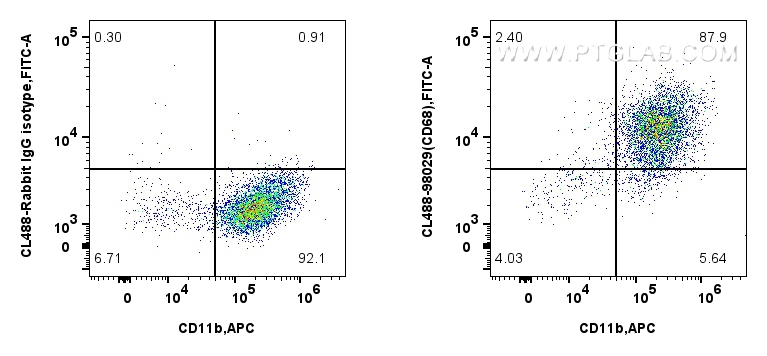验证数据展示
经过测试的应用
| Positive FC (Intra) detected in | mouse peritoneal macrophages |
推荐稀释比
| 应用 | 推荐稀释比 |
|---|---|
| Flow Cytometry (FC) (INTRA) | FC (INTRA) : 0.25 ug per 10^6 cells in 100 μl suspension |
| This reagent has been tested for flow cytometric analysis. It is recommended that this reagent should be titrated in each testing system to obtain optimal results. | |
| Sample-dependent, Check data in validation data gallery. | |
产品信息
CL488-98029 targets CD68 in FC (Intra) applications and shows reactivity with mouse samples.
| 经测试应用 | FC (Intra) Application Description |
| 经测试反应性 | mouse |
| 免疫原 |
CatNo: Eg0787 Product name: Recombinant mouse CD68 protein Source: mammalian cells-derived, pHZ-KIsec-C-6*HIS Tag: C-6*HIS Domain: 21-291 aa of NM_001291058.1 Sequence: DCPHKKAVTLLPSFTMTPTATESTASPTTSHRPTTTSHGNVTVHTSSGPTTVTHNPATTTSHGNATISHATVSPTTNGTATSPRSSTVGPHPGPPPPSPSPRSKGALGNYTWANGSQPCVQLQAQIQIRILYPIQGGRKAWGISVLNPNKTKVQGGCDGTHPHLSLSFPYGQLTFGFKQDLHQSPSTVYLDYMAVEYNVSFPQAAQWTFMAQNSSLRELQAPLGQSFCCGNASIVLSPAVHLDLLSLRLQAAQLPDKGHFGPCFSCNRDQS 种属同源性预测 |
| 宿主/亚型 | Rabbit / IgG |
| 抗体类别 | Recombinant |
| 产品类型 | Antibody |
| 全称 | CD68 antigen |
| 别名 | 230504G5, CD68 antigen, gp110, Scard1 |
| 计算分子量 | 35 kDa |
| GenBank蛋白编号 | NM_001291058.1 |
| 基因名称 | Cd68 |
| Gene ID (NCBI) | 12514 |
| RRID | AB_3673375 |
| 偶联类型 | CoraLite® Plus 488 Fluorescent Dye |
| 最大激发/发射波长 | 493 nm / 522 nm |
| 形式 | Liquid |
| 纯化方式 | Protein A purification |
| UNIPROT ID | P31996-1 |
| 储存缓冲液 | PBS with 0.09% sodium azide, pH 7.3. |
| 储存条件 | Store at 2-8°C. Avoid exposure to light. Stable for one year after shipment. |
背景介绍
Mouse CD68 (also known as macrosialin) is a type I transmembrane glycoprotein that is highly and specifically expressed by mouse tissue macrophages, and to a lesser extent by dendritic cells. It belongs to the lysosomal/endosomal-associated membrane glycoprotein (LAMP) family and primarily localizes to lysosomes and endosomes with a smaller fraction circulating to the cell surface. CD68 is also a member of the scavenger receptor family. It may play a role in phagocytic activities of tissue macrophages.
实验方案
| Product Specific Protocols | |
|---|---|
| FC protocol for CL Plus 488 CD68 antibody CL488-98029 | Download protocol |
| Standard Protocols | |
|---|---|
| Click here to view our Standard Protocols |



